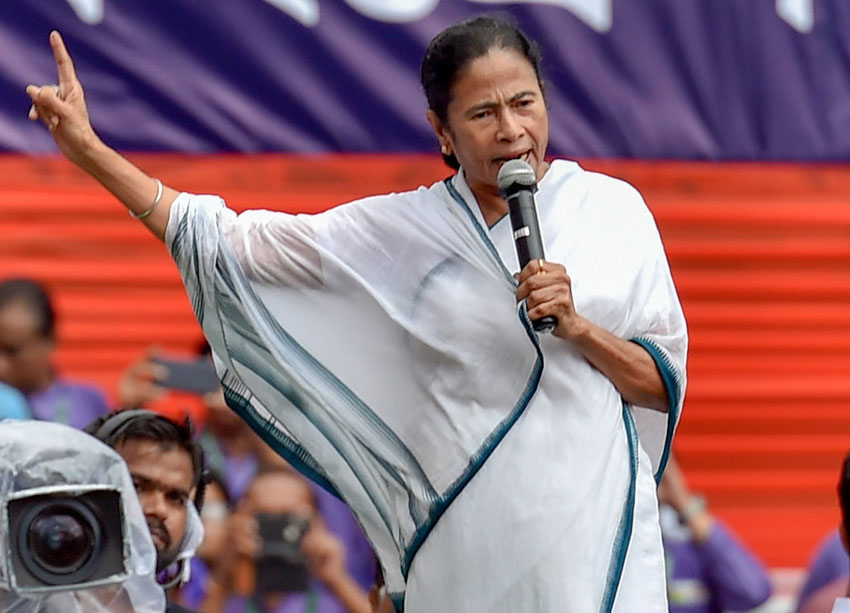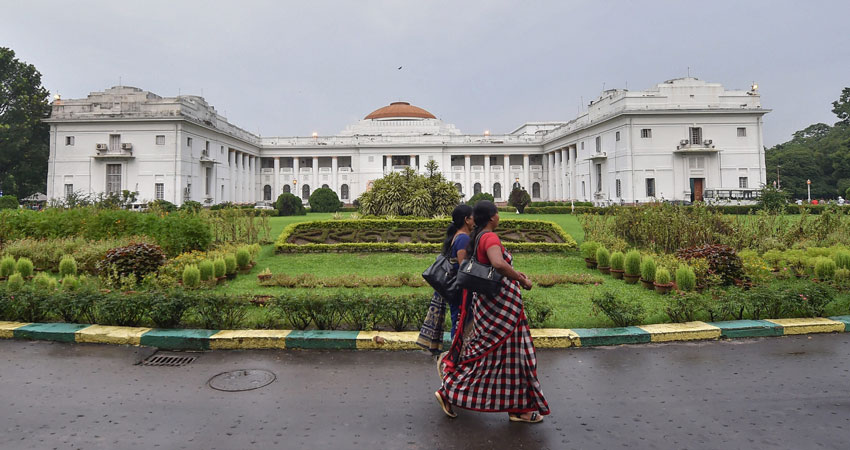West Bengal to Bangla: Some Say Good Riddance, Others Call it Exercise in Futility
A view of Vidhan Sabha after the West Bengal Assembly passed a resolution to rename the State as ‘Bangla’ in three languages — Bengali, English, and Hindi, in Kolkata, July 26. The state will now have to wait for a nod from the Union home ministry for the resolution’s final approval. (Swapan Mahapatra/PTI)
The West Bengal government’s decision to change the state’s name to Bangla drew mixed reactions from experts, with majority calling the axing of ‘west’ as a “good riddance” while some thought that the use of localized nomenclature may lead to “linguistic confusion,” writes Kunal Dutt.
Historians, architects, authors and art aficionados, all concurred that the word ‘west’ in the state’s name had been “superfluous” and an “alphabetical liability” for the past 70 years.
“In all public meetings, and government conferences, the ‘W’ set us down in the pecking order. By the time the state’s turn came, it would be either lunch time or fag end of the event. So, it is good if we lose that ‘W’ from our name,” said Jawhar Sircar, former chief of Prasar Bharati, who was born and raised in Kolkata.
He termed the move as a “very good step”, saying Bengal and Calcutta were “Europhile” names.
The West Bengal Assembly today passed a resolution to rename the state to Bangla. The state will now have to wait for a nod from the Union Home Ministry for the resolution’s final approval.
Noted historian Irfan Habib, said, “The ‘West’ in West Bengal had really become irrelevant as there is no ‘East Bengal’ now. But I feel Bengal would have made much more sense, and have had historical relevance. But politicians try to appeal to local sentiments.”
“But, anyway, people continue to use Calcutta, Bombay, Bangalore, Mysore despite their rechristenings, so I guess, Bengal would also not fade away even though it may be inked out officially,” he told PTI.
Author, poet and musician Amit Chaudhuri, who has been fighting to save the built heritage of Kolkata, termed the decision an “exercise in futility” to “score political points.”
“It is a waste of time. Had it been accompanied with real work in reviving of the industry and art and culture of Bengal, I would have understood, but is the real work happening. Look at the plight of heritage in our city (Kolkata),” he rued.
“Did renaming of Calcutta to Kolkata achieve anything? Did we become a better city? Did the living standards and quality of life of people improve? Did our institutions become better, on the other hand they became more politicized. And, I personally feel, old names should not be changed. Bengal is fine,” he said.
Chief Minister Mamata Banerjee told the West Bengal Assembly that the name Bangla was chosen as “it is the identity of Bengal.”

Artist Subhaprasanna Bhattacharjee, who is also the chairman of the West Bengal Heritage Commission (WBHC), claimed the renaming of the state to Bangla has been a “long-standing demand” of the people, and it will reflect our “Bengali pride.”
“Once approved, the WBHC will become ‘Bangla Heritage Commission’ and other government institutions would change names accordingly. Just like Kolkata, people will start using Bangla for the state name. Only a snobbish English daily and a few people use ‘Calcutta’ which was used by the British.” he said.
Chaudhuri, author of ‘Calcutta: Two Years in the City’ however, countered that “Bengali pride, does not come from merely changing names of streets, parks and cities, and erecting giant statues, but actual, concrete work”.
“Politicians would do well to focus on actual work than renaming exercise,” he said.
G.M. Kapur, convener of the Kolkata Chapter of Delhi-based heritage body INTACH, said, the word Bangla would also lead to confusion, linguistic or otherwise.
“The word Bangla has many shades of meaning — it refers to the state, the language Bengali, but in colloquial term, it also refers to country-made liquor. And, Bangla is also a truncated reference to Bangladesh, which was East Bengal during the colonial days,” he said.
“So, one can only imagine the confusion it is going to unleash, not mention the humor it will trigger,” Kapur said.
A Mumbai-based conservation architect, who did not wish to be named, said, “I am a Bengali, and yet I feel a sense of loss of identity when I think of losing Bengal from our state’s name.”
“The loss would also mean a loss of history, as identity and history are deeply intertwined. So, we we are venturing into a very ambiguous and ambivalent space here,” she said.
“For non-Bengali speakers, Bangla also means a bungalow or a house. It will confuse non-Bengalis and Bengalis, who do not reside in the state. So, let’s play it by the ear till then and see what happens,” she said.


